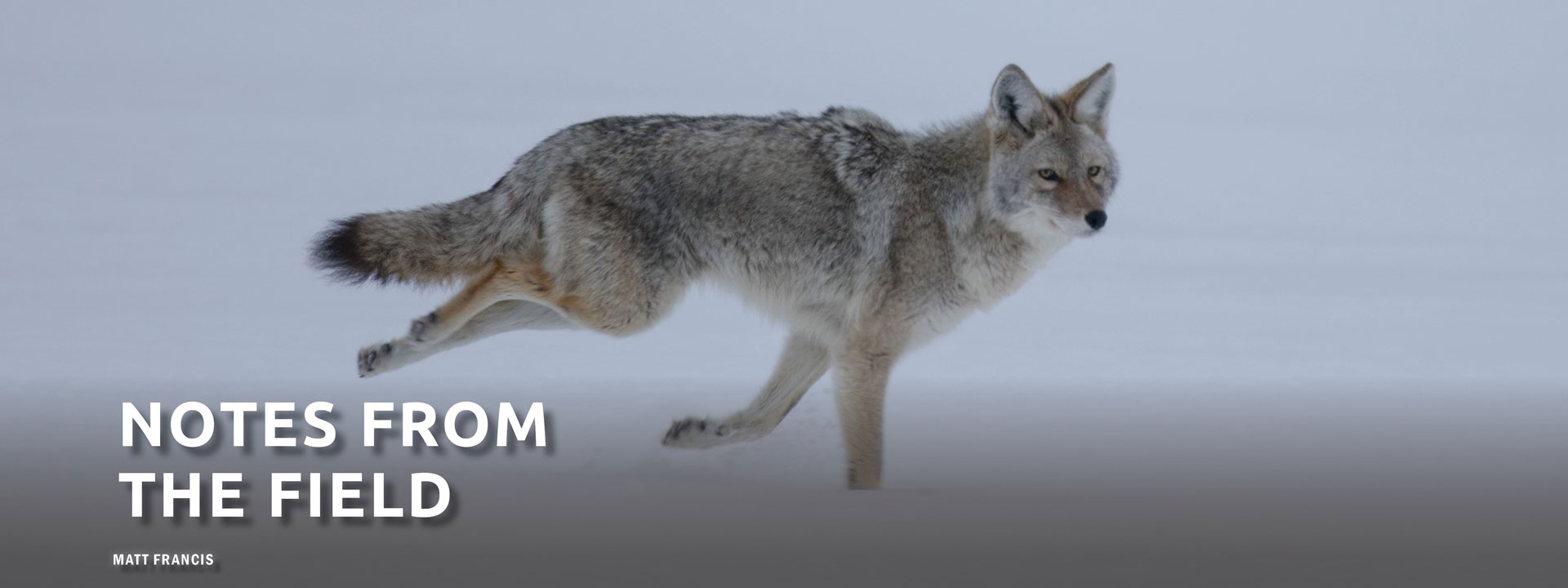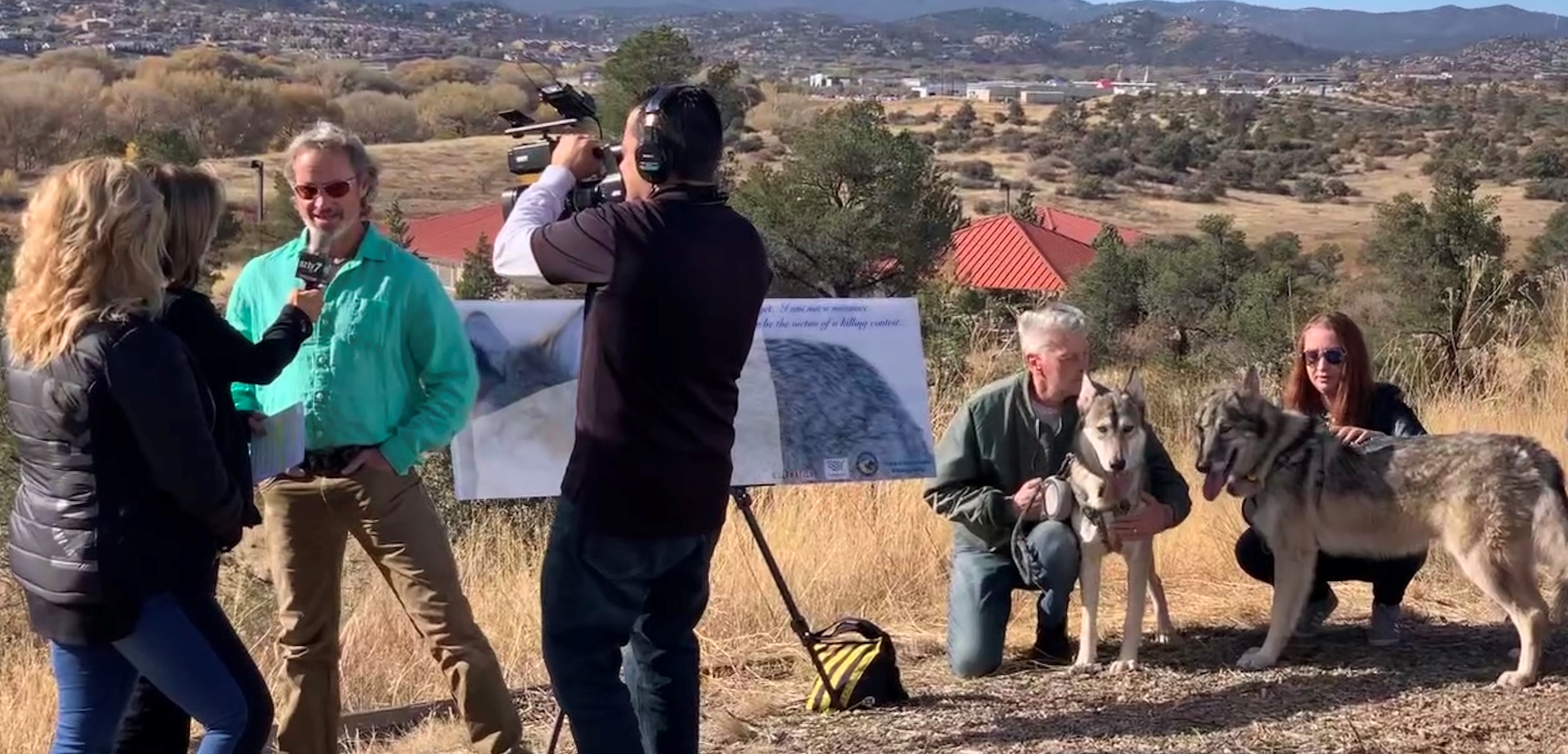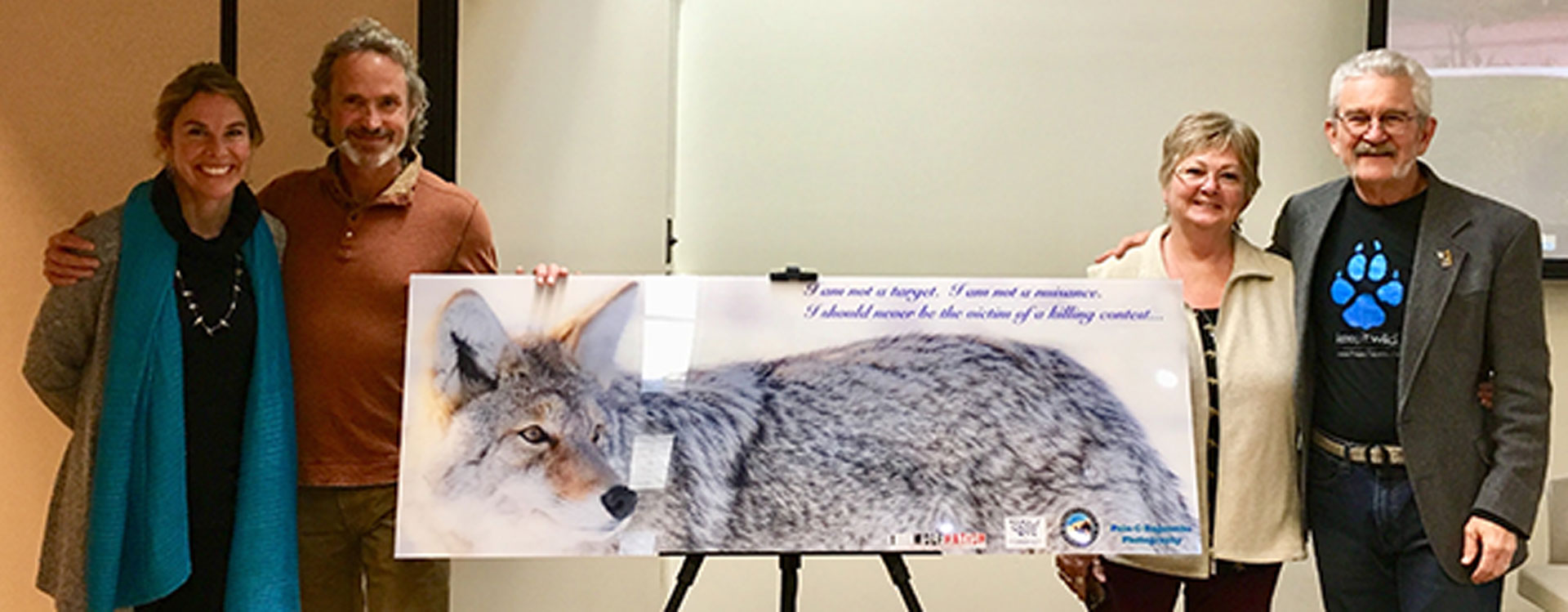Notes from the Field: Matt Francis
Matt Francis is the director of Prescott Observatory and Dark Star Quantum Cosmology Research in Prescott, Arizona, and is a fierce advocate for wildlife. Having joined Project Coyote as a Program Associate in late 2018, Matt has dedicated countless hours to ending wildlife killing contests in Arizona–and already has several victories under his belt! He and a committed group of local citizens, including Project Coyote Program Associate Linda Bolon, have significantly raised public awareness about killing contests in the state–including the gruesome Santa Slay Coyote Tournament. Matt and the team have organized several successful efforts to pass local resolutions (statements by city and county councils that condemn wildlife killing contests) in Arizona. Earlier this month, the city council of Flagstaff, Arizona, passed a resolution in opposition to killing contests, recognizing the important role that native carnivores play in healthy ecosystems and that such events are conducted for mere entertainment and threaten human and pet safety. Last year, the Dewey Humboldt Town Council and the Yavapai County Board of Supervisors enacted similar resolutions.
Project Coyote Science Advisory Board member Dave Parsons and I had the pleasure of meeting Matt and the local coalition last year at a screening of our documentary KILLING GAMES ~ Wildlife In The Crosshairs at Prescott College (where I completed my graduate studies under Dave Parsons’ mentorship). We were greatly impressed by Matt’s passion and perseverance. I hope you’ll find his work as inspiring as I do! (To learn more about banning wildlife killing contests, please visit the National Coalition to End Wildlife Killing Contests’ website here and the website for I AM WOLF NATION, a collective of Arizona advocates working to improve the treatment of coyotes and wolves, here.)
I look forward to joining Matt at Sedona Wolf Week, where we will show KILLING GAMES and discuss state and national efforts to ban wildlife killing contests and reform predator management.
For Wild Nature,
Camilla Fox
Founder & Executive Director
What led you to become involved in wildlife protection?
An impromptu visit I made to Yellowstone in January 2018 (during the blue moon, supermoon total lunar eclipse) to photograph wolves. I hired a wolf biologist to guide us, and although I don’t think we ever got closer than about a half-mile away, I was able to see them clearly and observe their behavior through my spotting scope. That experience changed me forever.
You are working with a small but growing group of citizens who work to end wildlife killing contests in Arizona. How are you raising public awareness about wildlife killing contests in Arizona? What is happening with these events in your state, and what spurred you to take action to stop these barbaric and deadly ‘games’?
Although the wolves in Yellowstone kept their distance, the coyotes did not—they were curious and came near us. It was the first time I had been that close to them and I found that they were spectacularly beautiful and intelligent creatures. I first learned that wildlife killing contests existed when I received an email in September from I AM WOLF NATION. The next day I contacted Betsy Klein, the director of that organization, and asked what I could do to help. Betsy suggested I attend public meetings and invited me to work with herself and others. The people I have met along the way and worked with are intelligent, motivated, and, most of all, compassionate—the best. Besides passing resolutions, we were interviewed on a TV morning show and for articles in Arizona newspapers; created a Facebook page; put up flyers around town, and created a website dedicated to ending wildlife killing contests. I am currently working on displaying photographs I have taken of coyotes (with imbedded messages) in local restaurants to raise awareness. Though the contests are taking place as scheduled, our resolutions and other public education awareness efforts are inspiring community residents to take action. Building this momentum will help us push for a state law banning these contests—our ultimate goal.
Your efforts have led to the passage of city and county resolutions in Arizona that condemn wildlife killing contests. Tell us about the process of working on policy at the local level–for example, how did you choose these localities? What steps did you take to get the resolutions passed? How did you work together with other citizens? What obstacles did you have to overcome?
Passing state laws requires significant support. Because few people know about wildlife killing contests in Arizona, we thought resolutions—official statements of policy or opinion from a city or county council—would be a good approach to get the word out about killing contests and garner momentum among the public and local governments for a state bill to ban the contests. Because the next scheduled killing contest was to take place in the nearby town of Dewey-Humboldt, we decided to inform their town council. We immediately gained the support of one motivated council member who I believe was critical in helping to convince the full council to pass our resolution. The resolution’s coverage by local media was effective at encouraging Yavapai County to pass a similar resolution/proclamation less than a month later.
Reviewing the format of other resolutions that appeared on the Dewey-Humboldt Town Council and Yavapai County websites helped us draft our own resolution. Being kind and respectful of town council and county board members fostered an atmosphere of cooperation crucial to our success. I wrote personal emails to each and every county board member and emailed all of them information that would help them make informed decisions—including a factsheet about killing contests, information about local events, and a statement signed by more than 70 conservation scientists that condemns killing contests. And, I was mindful not to harass them with repeated emails about my opinion or lack of perceived progress by them. We also recruited local citizens to attend and testify at public town council meetings to express their support for the resolution.
Regrettably, at one point the Dewey-Humboldt Town Council received emails from someone, or multiple people, threatening to boycott the town’s businesses if the Council did not pass the resolution. Threatening people is never a good solution. Even though we did not send those emails, we made sure to address the issue of threatening behavior by angry citizens at a later town meeting.
What makes these resolutions condemning wildlife killing contests so important?
These resolutions show that the public is not served by, and will no longer tolerate wildlife killing contests. We believe if we can get enough counties to pass resolutions opposing killing contests, state legislators and the governor will have the public support needed to pass laws banning killing contests.
You believe wildlife killing contests are in violation of state gambling laws. Tell us about that.
Absolutely. Arizona state gambling statutes are clear about separating participants from their money in the form of entry fees and the involvement of chance and skill for the purpose of winning prizes and cash. We have confirmation from the Arizona Gaming Commission attorney that these killing contests are in fact against Arizona state law. We expect to be effective in 2019 at stopping these contests.
What are your next steps for ending wildlife killing contests in Arizona?
We believe a multifaceted approach to be the best way forward—public education, policy, and litigation, including the gambling angle mentioned above. We have hired a local attorney with extensive experience in conservation to help with upcoming civil suits that we will bring later this year. We are also working behind the scenes at the state level so that once we have fulfilled our objectives for state legislation we will be ready to move forward immediately. We have another screening of KILLING GAMES ~ Wildlife In The Crosshairs coming up for Coconino County and other counties to raise awareness. I cannot go into too much detail here because I want to preserve our strategy. Suffice it to say, we are not going away until killing contests are illegal in Arizona.
Matt Francis being interviewed for Sandy Morning Show in Prescott, AZ.
Do you have any tips you’d like to share with our readers about how they can work to end killing contests in their own states?
You have to start someplace—and I believe the most logical place to start is with your local government and in raising public awareness through social media, screenings of KILLING GAMES, and other avenues. Because counties represent larger populations of voters than towns or cities, they should be a priority for petitioning to pass resolutions. While they are more of a challenge to pass than resolutions because they create a new law, municipal ordinances may also be an option. [For sample resolution language, please contact Project Coyote at info@projectcoyote.org.]
Even though I was following Betsy Klein’s advice to attend local meetings, I assumed I would be alone in this and that it would take years—but that was not the case. I quickly met a core group of passionate, wonderful people who created a more efficient team than I could have ever imagined. I suspect this is not unusual, and that the majority of Americans do in fact care a great deal about wildlife.
Most importantly: Don’t wait, start now. Contact your local policymakers, state lawmakers, and state wildlife agency to encourage a ban on wildlife killing contests; submit letters to the editor of your local paper explaining why killing contests are cruel and ecologically damaging; and share information about killing contests on social media and with your family, friends and colleagues. Project Coyote has a variety of resources to get you started including an advocacy postcard, a factsheet about killing contests, and a statement signed by more than 70 prominent conservation scientists that condemns killing contests. For more information and resources, visit the National Coalition to End Wildlife Killing Contests’ website here.
Matt Francis with Camilla Fox, Linda Bolon and Dave Parsons – Prescott, Arizona (November 2018)
Why did you decide to join Project Coyote?
I was approached by Project Coyote Program Associate Linda Bolon via email. She had heard about the Yavapai County Board of Supervisors and Dewey-Humboldt meetings on killing contests that I had been attending. I think Linda knew I was motivated and wouldn’t quit. When she contacted me, I went on the Project Coyote website and read much of the material and watched all the videos. I was impressed with the Science Advisory Board, and the emphasis on science. I also appreciated the organization’s focus on education regarding coyotes and other persecuted wild carnivores and promotion of extensive coexistence literature. For those individuals wanting to learn about coyotes, it is a “one stop” organization that provides a wealth of factual information. Joining Project Coyote was an easy decision for me. After joining, I was also fortunate that Camilla Fox and Project Coyote Science Advisory Board Member Dave Parsons made the journey to my home in Prescott, Arizona, for our screening of KILLING GAMES. It is rare to find such intelligent, adventurous, engaging individuals who are also funny and easy to be with. With so much to accomplish, time is something that is always on my mind—with Camilla and Dave, no time was wasted, only the creation of good memories.
People can go through their entire professional careers thinking that their most important contributions to society were made within the confines of their professions. I felt this way about my career in electron microscopy and subsequent cosmology research–but now I’m not so sure. I suspect the work I am doing now will have far more positive impact on the biosphere of Earth than anything else I accomplished professionally.





